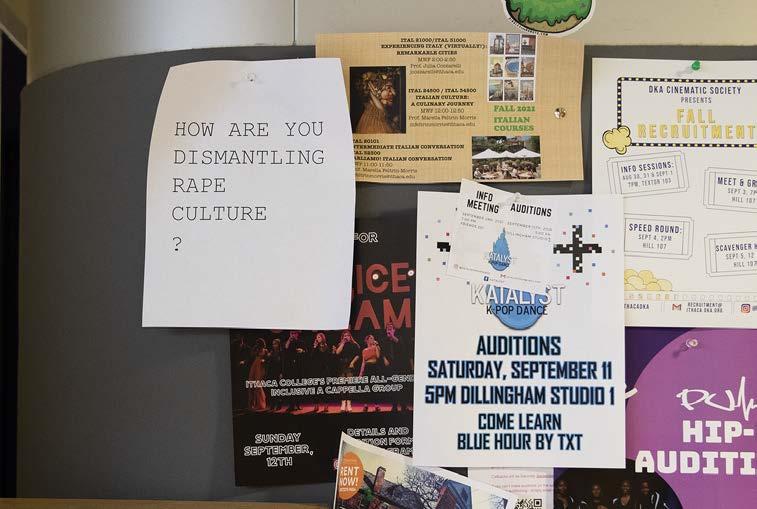
4 minute read
Zine Addresses Rape Culture
POSTERS AROUND CAMPUS AND STUDENT ZINE ADDRESS CULTURE AROUND SEXUAL ASSAULT
BY LORIEN TYNE
Advertisement
Scattered all across the Ithaca College campus are booklets with the words “Don’t Be Friends With Rapists” printed in bold font, along with posters that say “Believe Survivors,” “How Are You Dismantling Rape Culture?” and “Believe Survivors, Not Gossip.” First circulated anonymously, the zine and posters are part of one senior’s
campaign to call attention to the importance of sexual violence prevention.
The zine covers the topics of victim blaming, rape culture, allyship and bystander intervention. The zine addressed that consent is essential and that victims of sexual violence are never at fault for the actions of perpetrators.
It also mentioned that there is a lack of reporting on sexual violence that happens, what rape culture sounds like and, through tweets and data, made connections between culture and how it infuences reporting.
Senior Aiden Nelson, author of the zine, said they wanted to let the college community have organic reactions to the zine, a reason that they did not attach their name to it.
Nelson said now that some time has passed and community members were able to have an uninfuenced and unbiased perspective of the zine, they felt comfortable coming forward as the author.
Nelson said that they began putting up the posters in early September and that the zine was the next step. Although they distributed the zine independently, they are currently a member of IC Strike, a student organization that focuses on education, activism and allyship for survivors of sexual violence.
According to the IC Strike Engage page, the mission of the group is to create a space for survivors to share their stories and for allies to listen to these stories. Additionally, the group strives to share resources and
raise awareness about the complexity of sexual assault.
Nelson said that their goal for the zine was to validate survivors and make people uncomfortable enough to think critically about rape culture.
“In my head, the ideal situation was like, it’ll make survivors feel validated in their anger and potentially make people uncomfortable with how they handle themselves and make them actually question [their actions],” Nelson said.
Out of all college-age students in the United States, 13% reported experiencing rape or assault, according to the Rape, Abuse & Incest National Network (RAINN). Approximately 51.1% of female survivors were raped by an intimate partner and 40.8% of female survivors were raped by an acquaintance, according to the National Sexual Violence Resource Center (NSVRC).
The college has prevention tools like the Rave Guardian app and the Safe Escort Program. The Rave Guardian app provides safety alerts, quick access to emergency contacts, access to college emergency resources and the Guardian Timer, which a student can use to invite someone else to virtually escort them to and from a location. The Safe Escort Program provides members of the campus community with someone to accompany them to and from anywhere on campus.
However, Nelson said that efforts like this do not actually solve the issue that they are trying to address. Nelson said these tools provided by the college are not going to prevent many instances of sexual violence because most survivors know the perpetrator and are assaulted in private settings.
According to RAINN, 55% of sexual assaults occur at or near the victim’s home. Additionally, 39% of rapes are committed by an acquaintance and 33% by a current or former partner.
In comparison, 19.5% of rapes are perpetrated by a stranger. Efforts like the Safe Export Program and the Rave Guardian app do not necessarily help in situations such as these in which the survivor was assaulted by somebody they knew.
Nelson also said they think the consent education training that takes place during orientation is not enough because the conversation needs to be a more regular occurrence on campus. “When you frst come to IC, you’re just bombarded with information, and [the consent training] is just another box you, have to tick,” Nelson said. “I know that I did take it, but I don’t remember the information that was provided within the little course.”
Linda Koenig, Title IX coordinator in the Department of Legal Affairs, said bystander intervention is crucial to create a safer campus community.
A recent initiative that Koenig is a part of is called IC Responsibility (ICR), which aims to give students the tools to be socially responsible and caring community members. The program takes students through a range of workshops that revolve around learning to be a good member of society. Some topics included are bystander intervention, frst responder training, identities, privilege and mental health. Once the foundational workshops are completed, students can proceed by specializing in one topic.
“[Being an ally means] being able to recognize there’s a problem, knowing what the resources are and then understanding how to deliver that information in a way that really empowers [a survivor],” Koenig said. Natasha Bharj, assistant professor in the Department of Psychology, is a board member of ICR. She mentioned the importance
A poster created by senior Aiden Nelson that addresses rape culture. Posters for the campaign were posted anonymously. Eleanor Kay/The Ithacan










